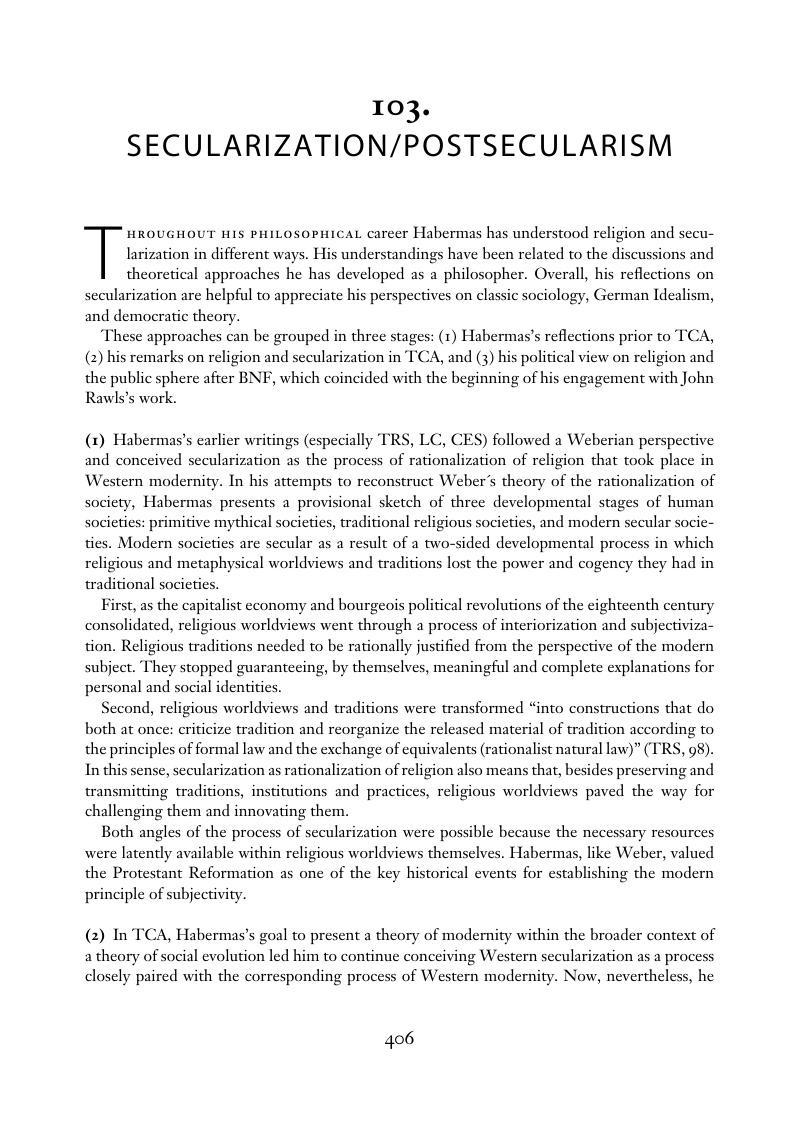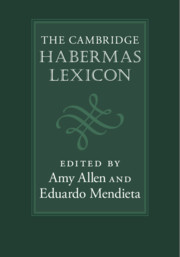Book contents
- The Cambridge Habermas Lexicon
- The Cambridge Habermas Lexicon
- Copyright page
- Contents
- Contributors
- Preface
- Chronology of Jürgen Habermas
- Abbreviations
- Works by Jürgen Habermas
- I Terms
- 1. Aesthetics
- 2. All-Affected Principle
- 3. Application and Justification
- 4. Argumentation
- 5. Authenticity
- 6. Autonomy
- 7. Axial Age (Achsenzeit)
- 8. Civil Disobedience (Ziviler Umgehorsam)
- 9. Civil Society (Bürgerliche Gesellschaft)
- 10. Colonization of the Lifeworld
- 11. Communicative Action
- 12. Communicative Competence
- 13. Communicative Freedom
- 14. Communicative Power
- 15. Communicative Rationality
- 16. Consensus
- 17. Conservatism
- 18. Constitutional Patriotism
- 19. Constitutional State and Constitutionalization
- 20. Cosmopolitan Citizenship
- 21. Counterfactual Presupposition
- 22. Critical Hermeneutics
- 23. Critical Theory
- 24. Deconstruction
- 25. Deliberative Democracy
- 26. Detranscendentalization
- 27. Discourse
- 28. Discourse Ethics
- 29. Enlightenment
- 30. Equality
- 31. Ethics and Morality
- 32. Europe (European Citizenship and Public Sphere)
- 33. Facticity
- 34. Feminism
- 35. Formal/Universal Pragmatics
- 36. The Frankfurt School
- 37. Free Will and Determinism
- 38. Functional and Social Integration
- 39. Functionalist Reason
- 40. Genealogy
- 41. Hermeneutics
- 42. Historians’ Debate
- 43. Historical Materialism
- 44. Human Nature
- 45. Human Rights
- 46. Ideal Speech Situation
- 47. Ideology
- 48. Illocutionary Force
- 49. Immanent Critique
- 50. Individuation
- 51. Instrumental Reason
- 52. Intellectual
- 53. Jewish Philosophy
- 54. Juridification
- 55. Justice
- 56. Knowledge Anthropology (Erkenntnisanthropologie)
- 57. Language and the Linguistic Turn
- 58. Late Capitalism
- 59. Law
- 60. Learning Processes
- 61. Legitimation
- 62. Lifeworld and System
- 63. Linguistification
- 64. Markets
- 65. Mass Culture
- 66. Mass Media
- 67. Migrants and Refugees
- 68. Modernity and Modernization
- 69. Moral Development
- 70. Multiculturalism
- 71. Multiple Modernities
- 72. Naturalism
- 73. Nature
- 74. Performative Self-Contradiction
- 75. Philosophical Anthropology
- 76. Philosophy of History
- 77. Philosophy of the Subject/Consciousness
- 78. Popular Sovereignty
- 79. The Positivism Debate
- 80. Postcolonialism/Decoloniality
- 81. Postliberal Society
- 82. Postmetaphysical Thinking
- 83. Postmodernism and Poststructuralism
- 84. Postnational
- 85. Power
- 86. Practical Reason
- 87. Pragmatic Turn
- 88. Pragmatism
- 89. Praxis
- 90. Principle of Self-Reconstruction (Selbsteinholungs Prinzip)
- 91. Private and Public Autonomy
- 92. Psychoanalysis
- 93. Public Sphere
- 94. Race
- 95. Radical Reformism
- 96. Rational Reconstruction
- 97. Rationality/Rationalization
- 98. Recognition
- 99. Reification
- 100. Religion
- 101. Ritual and Myth
- 102. Rule of Law
- 103. Secularization/Postsecularism
- 104. Semantic Contents
- 105. Social Evolution
- 106. Social Pathology
- 107. Socialism/Marxism
- 108. Society
- 109. Solidarity
- 110. Speech Act
- 111. Strategic Rationality
- 112. Subjective/Basic Rights
- 113. Systematically Distorted Communication
- 114. Technology
- 115. Transitional Justice
- 116. Truth
- 117. Universalization Principle and Discourse Principle
- 118. Utopia
- 119. Validity
- 120. Validity Claim
- 121. Vulnerability
- 122. World Disclosure (Welterschließung)
- II Names
- Bibliography
- Index
- References
103. - Secularization/Postsecularism
from I - Terms
Published online by Cambridge University Press: 29 March 2019
- The Cambridge Habermas Lexicon
- The Cambridge Habermas Lexicon
- Copyright page
- Contents
- Contributors
- Preface
- Chronology of Jürgen Habermas
- Abbreviations
- Works by Jürgen Habermas
- I Terms
- 1. Aesthetics
- 2. All-Affected Principle
- 3. Application and Justification
- 4. Argumentation
- 5. Authenticity
- 6. Autonomy
- 7. Axial Age (Achsenzeit)
- 8. Civil Disobedience (Ziviler Umgehorsam)
- 9. Civil Society (Bürgerliche Gesellschaft)
- 10. Colonization of the Lifeworld
- 11. Communicative Action
- 12. Communicative Competence
- 13. Communicative Freedom
- 14. Communicative Power
- 15. Communicative Rationality
- 16. Consensus
- 17. Conservatism
- 18. Constitutional Patriotism
- 19. Constitutional State and Constitutionalization
- 20. Cosmopolitan Citizenship
- 21. Counterfactual Presupposition
- 22. Critical Hermeneutics
- 23. Critical Theory
- 24. Deconstruction
- 25. Deliberative Democracy
- 26. Detranscendentalization
- 27. Discourse
- 28. Discourse Ethics
- 29. Enlightenment
- 30. Equality
- 31. Ethics and Morality
- 32. Europe (European Citizenship and Public Sphere)
- 33. Facticity
- 34. Feminism
- 35. Formal/Universal Pragmatics
- 36. The Frankfurt School
- 37. Free Will and Determinism
- 38. Functional and Social Integration
- 39. Functionalist Reason
- 40. Genealogy
- 41. Hermeneutics
- 42. Historians’ Debate
- 43. Historical Materialism
- 44. Human Nature
- 45. Human Rights
- 46. Ideal Speech Situation
- 47. Ideology
- 48. Illocutionary Force
- 49. Immanent Critique
- 50. Individuation
- 51. Instrumental Reason
- 52. Intellectual
- 53. Jewish Philosophy
- 54. Juridification
- 55. Justice
- 56. Knowledge Anthropology (Erkenntnisanthropologie)
- 57. Language and the Linguistic Turn
- 58. Late Capitalism
- 59. Law
- 60. Learning Processes
- 61. Legitimation
- 62. Lifeworld and System
- 63. Linguistification
- 64. Markets
- 65. Mass Culture
- 66. Mass Media
- 67. Migrants and Refugees
- 68. Modernity and Modernization
- 69. Moral Development
- 70. Multiculturalism
- 71. Multiple Modernities
- 72. Naturalism
- 73. Nature
- 74. Performative Self-Contradiction
- 75. Philosophical Anthropology
- 76. Philosophy of History
- 77. Philosophy of the Subject/Consciousness
- 78. Popular Sovereignty
- 79. The Positivism Debate
- 80. Postcolonialism/Decoloniality
- 81. Postliberal Society
- 82. Postmetaphysical Thinking
- 83. Postmodernism and Poststructuralism
- 84. Postnational
- 85. Power
- 86. Practical Reason
- 87. Pragmatic Turn
- 88. Pragmatism
- 89. Praxis
- 90. Principle of Self-Reconstruction (Selbsteinholungs Prinzip)
- 91. Private and Public Autonomy
- 92. Psychoanalysis
- 93. Public Sphere
- 94. Race
- 95. Radical Reformism
- 96. Rational Reconstruction
- 97. Rationality/Rationalization
- 98. Recognition
- 99. Reification
- 100. Religion
- 101. Ritual and Myth
- 102. Rule of Law
- 103. Secularization/Postsecularism
- 104. Semantic Contents
- 105. Social Evolution
- 106. Social Pathology
- 107. Socialism/Marxism
- 108. Society
- 109. Solidarity
- 110. Speech Act
- 111. Strategic Rationality
- 112. Subjective/Basic Rights
- 113. Systematically Distorted Communication
- 114. Technology
- 115. Transitional Justice
- 116. Truth
- 117. Universalization Principle and Discourse Principle
- 118. Utopia
- 119. Validity
- 120. Validity Claim
- 121. Vulnerability
- 122. World Disclosure (Welterschließung)
- II Names
- Bibliography
- Index
- References
Summary

- Type
- Chapter
- Information
- The Cambridge Habermas Lexicon , pp. 406 - 410Publisher: Cambridge University PressPrint publication year: 2019



